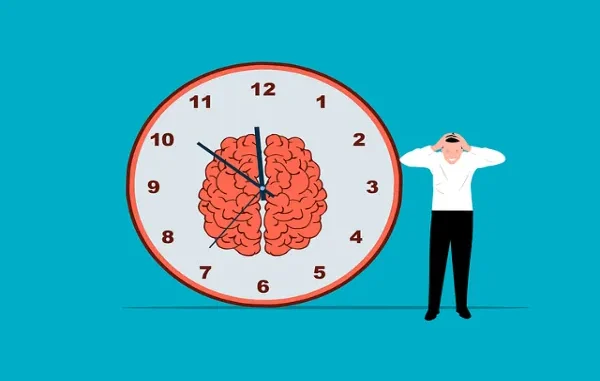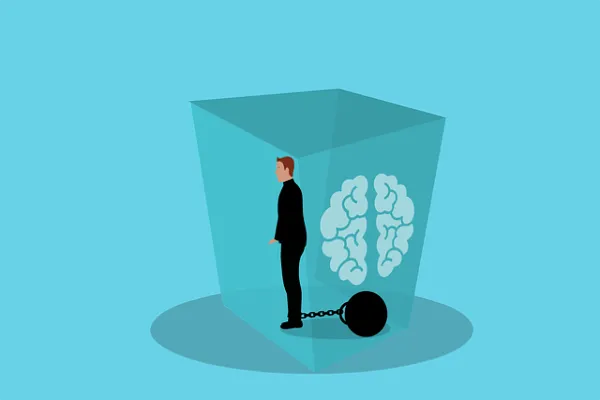
How Can I Stop Overthinking? A Practical Guide to Quieting Your Mind
Ever wondered: How can I stop overthinking? Our minds are powerful tools, churning out thoughts at a dizzying pace. But sometimes, that internal dialogue becomes a relentless loop, replaying anxieties and worries. It’s a familiar feeling: you lie awake at night dissecting a conversation, obsessing over a decision, or endlessly replaying a past mistake. You’ve fallen victim to overthinking.
What Is Overthinking?
Overthinking isn’t just dwelling on a complex problem. It’s the mental equivalent of a hamster on a wheel, endlessly circling repetitive thoughts. Imagine replaying a conversation with a friend, dissecting every word and agonizing over perceived slights. Or maybe you face a decision and get caught in a paralyzing loop of “what ifs,” analyzing every possible outcome until action feels impossible. That’s the essence of overthinking: getting stuck in a cycle of unproductive analysis that fuels anxiety and hinders progress.
Why Do I Overthink?
You overthink everything because your mind is wired to identify potential threats and avoid danger. This can be a helpful survival mechanism, but in the modern world, it can lead to an overactive “what-if” alarm. Factors like perfectionism, fear of failure, or past anxieties can also contribute to overthinking, making even simple decisions feel like navigating a minefield. The good news is, with awareness and effort, you can learn to quiet the mental chatter and reclaim control of your thoughts.
Stuck in the Overthinking Labyrinth? Here are the Signs
Do you ever feel like you’re lost in a maze of your own thoughts? Here are some telltale signs that overthinking might be holding you back:
- Future Fretting: You find yourself constantly worrying about the worst-case scenario, dwelling on unlikely events that steal your joy from the present moment.
- Past Regrets: You’re haunted by “should haves” and “could haves,” unable to let go of past choices and move forward with a clear mind.
- People Pleasing Paralysis: Every interaction becomes a replay in your mind, fueling social anxiety as you overthink what others might be thinking.
- Negativity Noise: Your inner voice becomes a relentless critic, churning out negative self-talk that reinforces feelings of doubt and inadequacy.
- Analysis Avalanche: Faced with a decision, you get buried in an avalanche of “what ifs,” overanalyzing every option to the point of paralysis.
- Emotional Rollercoaster: The constant mental churn fuels stress and depression, clouding your judgment and making it harder to navigate life’s challenges.
Overthinking often creates more problems than it solves. Making a decision, even if it’s not perfect, offers the chance to learn and grow. But making no decision at all keeps you stuck in the overthinking labyrinth. So, take a deep breath, recognize the signs, and start your journey out of the maze.
Destructive Thinking Patterns
Overthinking often gets tangled up with two unhelpful thought patterns: rumination and incessant worry. Rumination is like a mental hamster wheel, endlessly replaying past events and amplifying regrets. We might obsess over things like, “Why did I say that at the meeting? Now everyone thinks I’m incompetent,” or “Leaving my old job was a huge mistake. I’d be so much happier there.” We dwell on the “what ifs” and “should haves,” feeding negativity and self-doubt.
Incessent worry, on the other hand, is all about fixating on worst-case future scenarios. We build elaborate castles in the sand of disaster: “I’m going to bomb that presentation tomorrow,” or “Everyone else will get promoted but me.” These catastrophic predictions fuel anxiety and paralyze us from taking action.
Just like any habit, breaking free from these destructive thinking patterns takes time and effort. But with consistent practice and the tools mentioned earlier, we can retrain our brains to think more helpfully and embrace a brighter future.
How Do I Stop Overthinking?
So, how can you stop overthinking and reclaim control of your mental space? Here’s a practical guide packed with actionable strategies to quiet your mind and find peace:

From Problem to Solution
Mere rumination on problems is a mental dead end. It traps us in a cycle of negativity, offering no path forward. Instead, cultivate a problem-solving mindset. For situations within your control, brainstorm solutions. Challenge yourself to identify five potential fixes, or consider strategies to prevent the problem from recurring.
However, life throws curveballs, and sometimes we face situations beyond our control. In those instances, shift your focus to coping mechanisms. How can you navigate the challenge with resilience? Remember, you can always control your attitude and effort, even when circumstances seem overwhelming. By focusing on these controllable factors, you empower yourself to navigate difficulties with greater strength.
The Power of Scheduled Reflection
While aimlessly dwelling on problems is a recipe for anxiety, focused reflection can be a powerful tool. Taking a brief pause to analyze a situation, identify potential roadblocks, or strategize for future success can be incredibly productive.
Instead of succumbing to endless worry, incorporate a dedicated “thinking time” slot into your daily routine. This 20-minute window allows you to unleash your anxieties, mull over challenges, and strategize solutions. When the timer goes off, it’s time to move on. If overthinking creeps back in outside this designated period, simply remind yourself that these concerns can wait for their turn during your next scheduled “thinking time.” This structured approach allows you to address anxieties productively, without letting them hijack your entire day.
Identify Your Triggers:
The first step is understanding what sets you off. Do deadlines trigger a spiral of “what-ifs”? Does social interaction lead to self-doubt? Recognizing your triggers empowers you to anticipate them and implement coping mechanisms. Keep a journal to track your thoughts and emotions, noting situations that spark overthinking.
Challenge Unhelpful Thoughts:
Overthinking thrives on negativity bias. We tend to dwell on the worst-case scenario and magnify potential problems. Learn to challenge these distorted thoughts. Ask yourself: “Is this thought helpful?” “Is it based on reality, or worst-case assumptions?” Reframe negative thoughts into more balanced and realistic perspectives.
Schedule Worry Time:
Does worry hijack your entire day? Assign a specific time for worry. Set a timer for 15 minutes and let your mind run wild. Write down your anxieties and worries. When the timer goes off, compartmentalize those thoughts and move on with your day. This structured approach prevents worry from consuming your entire mental space.
Awareness is the First Step
The good news is, just like any muscle, your brain can be trained. The first step is becoming aware of your internal dialogue. Pay attention to your thought patterns – are they dominated by negativity and self-doubt? By observing your mental habits without judgment, you gain the power to choose differently. With consistent practice, you can replace unhelpful thinking patterns with more positive and empowering ones. This mental conditioning strengthens your inner resilience, making you better equipped to handle life’s challenges.
Practice Mindfulness:
Mindfulness is the art of paying attention to the present moment without judgment. Techniques like meditation and deep breathing can be powerful tools against overthinking. Focus on your breath, the sensations in your body, or the sounds around you. When your mind wanders, gently guide it back to the present.
Embrace Imperfection:
The pursuit of perfection fuels overthinking. We obsess over every detail, fearing failure. Remember, progress, not perfection, is the goal. Learn to accept mistakes as part of the learning process. Celebrate your efforts, not just flawless outcomes.
Engage in Activities:
An idle mind is a devil’s workshop. When your mind is free to wander, overthinking takes hold. Fill your time with activities that require focus and engagement. Exercise, tackle a creative project, learn a new skill, or connect with loved ones. Distraction is a powerful tool to break the cycle of overthinking.
Breaking the Thought Cycle:
Trying to force a thought out of your head is like trying to hold onto a beach ball underwater – the more you push, the more it fights back. Instead, you need to introduce a distraction, a mental detour that redirects your focus. This can be anything that requires your full attention: engaging in a conversation about a different topic, tackling a creative project, or even breaking a sweat with some exercise. By directing your energy elsewhere, you disrupt the cycle of overthinking and give your mind a much-needed reset.
Seek Professional Help:
If overthinking is significantly impacting your daily life or causing emotional distress, don’t hesitate to seek professional help. Therapists can teach you cognitive-behavioral therapy (CBT) techniques to identify and modify negative thought patterns.
Change takes time. Don’t get discouraged if you don’t see immediate results. Be patient, consistent, and celebrate every small victory. Here are some additional tips to keep in mind:
- Limit Caffeine and Alcohol: Both can exacerbate anxiety and exacerbate overthinking.
- Get Enough Sleep: A well-rested mind is better equipped to manage thoughts and emotions.
- Practice Gratitude: Reflect on the good things in your life. Gratitude fosters a more positive outlook, reducing space for worry.
- Limit Social Media: Constant comparison and unrealistic portrayals on social media can fuel overthinking.
Overthinking is a common challenge, but it doesn’t have to control you. By employing these strategies and cultivating self-awareness, you can quiet the mental chatter and find serenity. Remember, you have the power to reclaim your mental space and live a more present, fulfilling life.
Related:

Leave a Reply